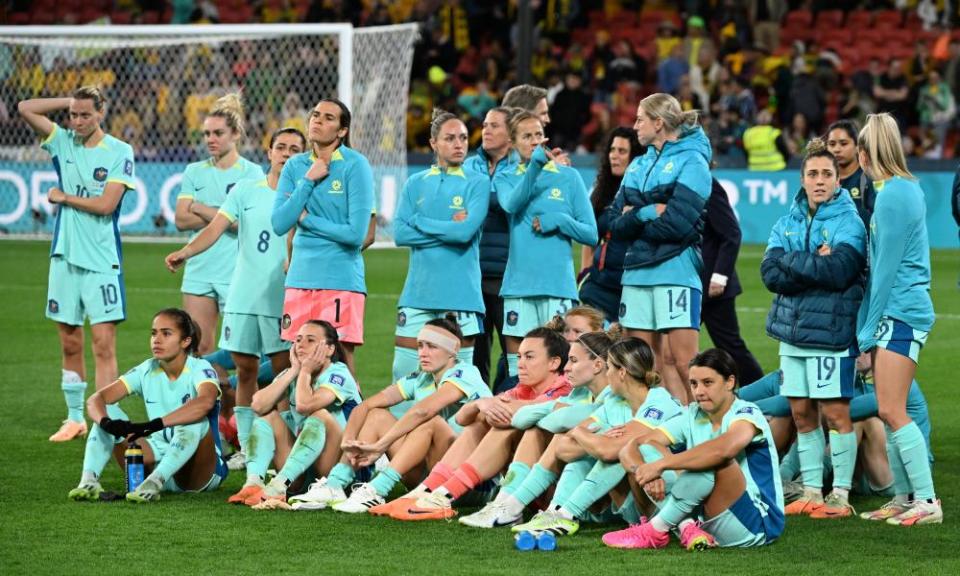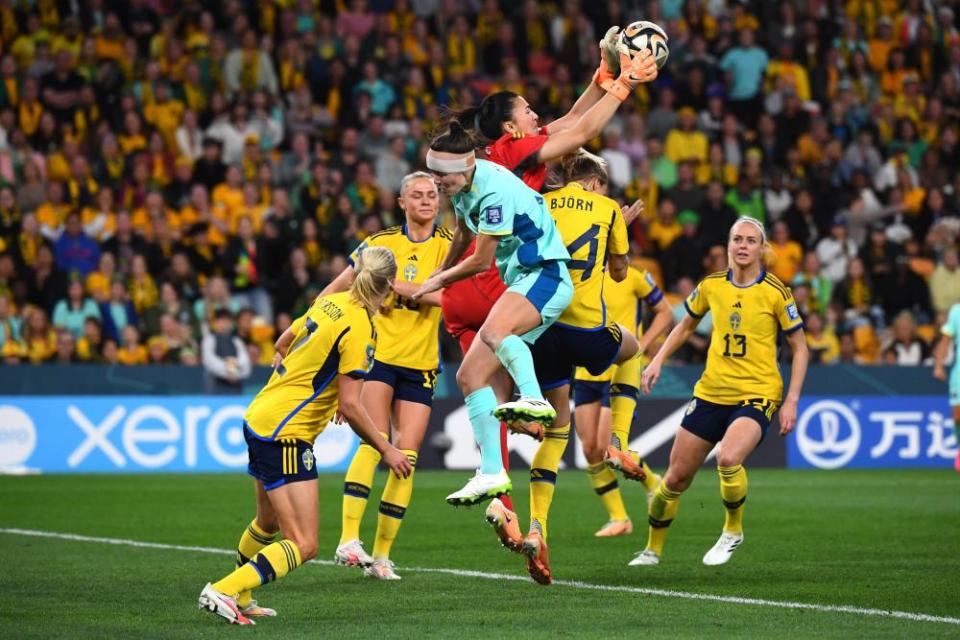Matildas’ loss to Sweden falls short in a World Cup that surpassed expectations

These two things can both be true: the Matildas overachieved at this World Cup, and underachieved against Sweden on Saturday.
Australia’s fourth-placed finish at the World Cup following a magical month that enchanted a nation is better than anyone could have expected. Indeed, with the exception of the USA, it is the best-ever performance by a host country. Australians should rightly feel proud of these Matildas after a heroic World Cup run, in the face of sustained adversity – most notably Sam Kerr’s calf injury.
Related: Matildas sign off with defeat as Sweden secure third place at Women’s World Cup
The team have changed the status of football in Australia, possibly forever, and secured more than $200m in additional funding for women’s sport. In the years ahead, young girls will flock to the sport in increased numbers inspired by this World Cup; young boys will grow up with high-profile female sporting role models. The semi-final against England literally stopped the nation; the 11.5 million viewers set a new benchmark for the most-viewed program in local broadcast history.
That off-field impact is remarkable, transformative even, and it is matched by their on-field success. The Matildas have now finished fourth in the most recent editions of the two biggest tournaments in women’s football – the World Cup and the Olympics – in the space of just 24 months. For a team ranked 10th in the world, that represents consistent overachievement. It suggests the Matildas belong with the elite in women’s football.
But it is possible to think all of the above and still consider that the Matildas’ loss to Sweden in the third-place match was disappointing, an ill-fitting end to an otherwise glorious World Cup. It is possible to think that Tony Gustavsson’s squad management throughout this tournament has been questionable, his use of an unchanged lineup on Saturday ill-advised, and failure to make substitutes until midway through the second half a mistake.
Not only is it possible for these views to coexist, it is important for the progression of the game in Australia, for the future of the Matildas, that they do. Fans can and should bask in the glory of this past month and still push for an even better future. Because if this was a World Cup that surpassed expectations, the loss to Sweden fell short.

After a physically and emotionally draining month, the Matildas looked sluggish from the off in Brisbane. Despite using the fewest squad members and least substitute minutes of any team at this tournament, Gustavsson opted for an unchanged starting XI. In one sense it was no surprise – he had said as much at his pre-match press conference, insisting he was preferencing relationships and continuity over fresh legs. “It’s not about giving players experience just for the sake of giving experience, this is a game to win,” he said.
But they didn’t win – and the Matildas’ difficulty matching Sweden’s tempo, especially in the first half, raises real questions about whether sticking with the same lineup was the right plan. It was the first question Gustavsson faced after the match: “Why didn’t you turn to depth and fresh legs?” The coach batted it away. “If I would have rotated a lot of players and then lose, it would have been why didn’t you stick with it,” he said. “And if I [don’t rotate] and lose then it would be a sharp question.” His answer glossed over just how tired his starting XI looked late in the first half and early in the second.
Despite Australia playing in the maximum number of matches at this tournament, three outfield players – Aivi Luik, Clare Wheeler and Kyah Simon – have not played a minute. Wheeler’s absence is particularly surprising, given her promise as an emerging defensive midfield dynamo. Charlotte Grant only managed a handful of minutes in one match, while Courtney Nevin earned her World Cup debut late on against Sweden. In other words, from a squad of 20 outfield players, five players had no or negligible minutes.
Simon’s selection in the squad has looked increasingly odd as the tournament went on; she has been recovering from a long-term ACL injury and was picked, so Gustavsson explained at the time, for her penalty skills and late gamechanging ability. Yet Simon was not used, even when the quarter-final went to penalties, or when the Matildas were chasing games. On Saturday, Gustavsson explained that Simon had faced “some set-backs” in her recovery. Hindsight may be 20-20, but her inclusion always seemed at best speculative.
Related: Sweden2-0 Australia: Women’s World Cup third-place playoff player ratings | Carly Adno
These questions, and more, need to be asked. It is not enough for the Matildas management to rest on their laurels. Australia will progress as a football nation at the highest level through constant questioning and accountability. Gustavsson is certainly not resistant to the debate. “That’s a good question” or “that’s a fair question” are among his catchphrases at press conferences. But he has questions to answer, notwithstanding how remarkable the past month has been.
And so the Matildas’ World Cup journey comes to an end. A dream, a daze, four weeks that will never be forgotten. On Sunday morning the Matildas will be celebrated on the streets of Brisbane with a parade, a well deserved display of public affection for a team that has left an extraordinary legacy.
But in the weeks and months ahead, Gustavsson and his team, and everyone at Football Australia, will have work to do. The success of lower-ranked teams at this tournament have underscored the pace of growth in the women’s game across the globe, supercharged by investment at club-level across Europe. If the Matildas do not keep moving forward, they risk being left behind. The success of the past month does not change that fact – but it can provide the impetus for the team to do even better next time.

 Yahoo Sport
Yahoo Sport 





































